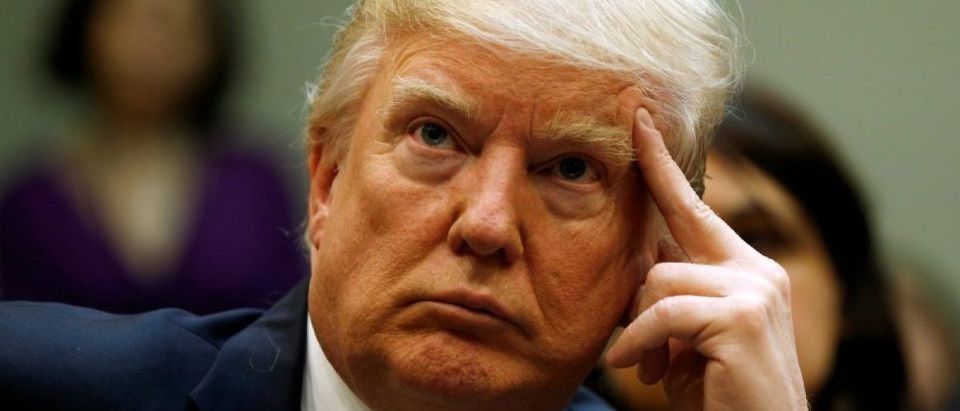In a rare public interview last month, former president George W. Bush came out publicly against a number of Trump administration policies, including a travel ban on visitors from Muslim-dominated countries and calls for a tougher immigration border policy.
He also suggested that Republicans were right to investigate the Trump team’s alleged ties to Russia and whether those ties influenced the election.
To some it’s the latest sign that the Bush-Trump feud – which reached a high point during the 2016 campaign when Trump publicly humiliated Dubya’s brother Jeb – is far from over.
But if so, that feud does not extend to officials who loyally served Bush during his two terms in office, including many with close ties to Bush’s father and to the Bush family generally.
On the contrary, look deeper into the Trump administration’s personnel decisions, it’s apparent at nearly every level of government — but especially on foreign policy — Trump is turning with increasing favor to former top-level Bush administration officials for guidance and support.
It may eventually create some fresh controversy for Trump.
The latest sign that the dreaded “Bushies” are returning to command the national government was Trump’s decision last week to name Dina Powell as his deputy national security advisor.
Powell, a top official at Goldmann Sachs, and a close advisor to Ivanka Trump, was herself in charge of personnel appointments under Bush, and at the time received high marks for her performance.
Powell was born in Egypt, and is Trump’s first Arab-American appointment, but she traces her roots to Bush’s Texas, where her family immigrated when she was just 4.
She began her political career as an intern to Texas senator Kay Bailey Hutchison, who is extremely close to the Bushes. Former president George H.W. Bush endorsed her run for governor in 2010 over rival Rick Perry, who is currently Trump’s energy secretary.
But Powell’s only the latest “Bushie” to either join the administration or be nominated for a top post.
Former CENTCOM commander and former Navy SEAL Vice-admiral Robert Harwood, a top counterterrorism advisor to Bush, was nominated by Trump in February to become his national security advisor, and would likely have been Powell’s boss had he agreed to take the job.
Why such a strong reliance on Bush-era personnel?
Republican insiders say that Trump has struggled to find qualified people to serve under his top cabinet appointments at the undersecretary and assistant secretary level either because of disagreements with Trump’s foreign policy vision or because of fears of being tainted by their association with a man that many Bush-era officials feel may not be up to the job of commander-in-chief.
There are exceptions, of course. Former vice-president Dick Cheney has strongly supported Trump; so has former defense secretary Donald Rumsfeld. But until fairly recently, most lower-level officials have steered clear of the new administration.
Insiders say a key breakthrough occurred when former Bush national security advisor Condoleeza Rice and former Bush defense secretary Robert Gates stepped in to promote Exxon CEO Rex Tillerson as Secretary of State.
At the time Trump was struggling to find an appropriate pick and even flirted with naming former GOP president candidate Mitt Romney to the post, a prospect that nearly tore the new administration apart.
Rice and Gates had served on the Exxon board with Tillerson and offered to help. Trump, who professes great admiration for Rice, agreed to listen, and within short order, the deal was made.
It’s not known if that decision opened the floodgates to consideration of other ex-Bush administration officials, but since Tillerson’s appointment, those appointments have come, though the Trump team has done its best to play down its ties to a presidency and a political family it has mocked – only to be mocked in return.
At one level, going back to the Bush era makes sense since it’s the last time Republicans held national office, and there’s a deep bench of talent available to be recruited. But insiders say it hasn’t been easy on either camp given the antipathy that continues to divide Trump and the Bushes publicly.
In addition, a de facto rapprochement could real raise hackles among Republican conservatives if it were perceived as Trump backsliding on his commitment to stake out new policy territory and defy the “Washington establishment.”
Trump is also considering two other top-level Bush officials for prominent foreign policy roles, including Stephen Hadley, who served as Bush’s national security advisor, and John Bolton, who served as Bush’s U.N. ambassador. Reportedly, Fran Townsend, who served as the former president’s homeland security advisor, is another “Bushie” being considered for a post.
For now the decided Bush-tilt in Trump’s personnel appointment process has raised barely a peep of protest in part, because sub-cabinet hires do not require confirmation, and because most public attention has focused on controversial figures like Gen. Michael Flynn that have raised the hackles of liberals, not conservatives.
But Trump’s increasing reliance on the Bush establishment may not remain a secret for much longer. A new controversy is erupting this week over Trump’s decision to place former Bjush official Bill Steiger in overall charge of smoothing the personnel transition from the Obama administration.
Steiger was George W. Bush’s high-profile global health czar for two terms. But he also has an unusual pedigree: He’s former president George H.W. Bush’s godson.


